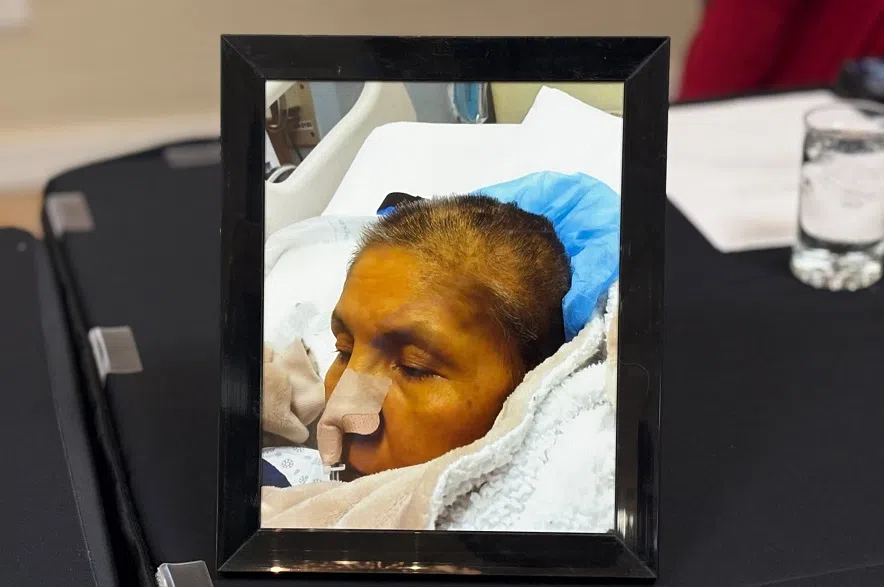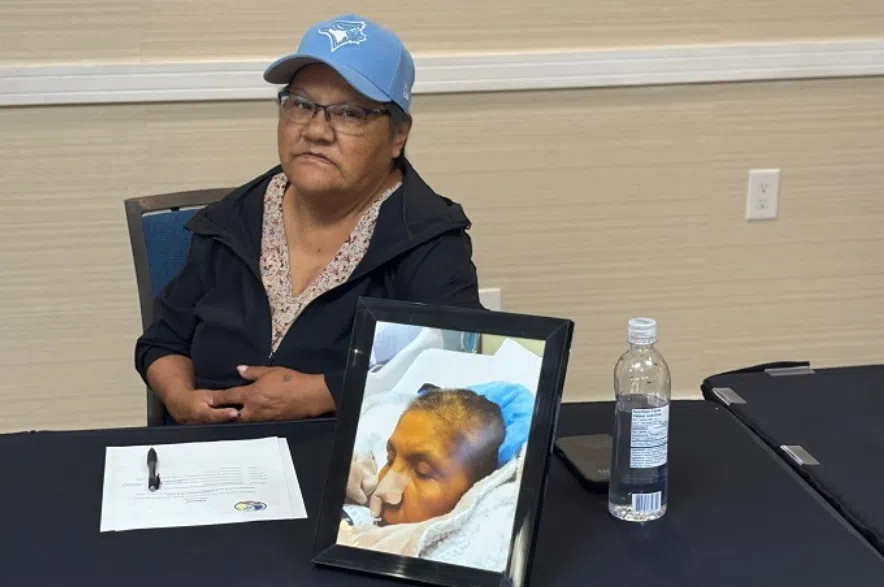The family of First Nation’s woman Corina Morin say her rights, traditions, and beliefs were violated when hospital staff in Saskatoon cut her hair without her consent.
Morin, 54, was admitted to the ICU at the Royal University Hospital on June 10. She died in July while in hospice care.
Read more:
- Social worker to give valuable support to students at Sask. First Nation
- Standing Buffalo Dakota Nation advances international trade corridor
- Tune in to Indigenous podcast Meeting Ground every Saturday
According to the First Nation’s Health Ombudsperson’s Office, hospital records confirmed Morin wasn’t able to provide informed consent, and the decision to cut her hair was made by a registered nurse without a formal assessment.
“Corina, who spent her final days in hospice care, was distressed and could not recall ever being asked or included,” a media release from the ombudsperson’s office said.
“I sit here today and stand with the family in solidarity so that these things don’t happen again — they can’t happen again,” First Nation’s Health Ombudsperson Dianne Lafond told reporters at the Saskatoon Inn on Tuesday.
“There’s never a reason why anybody would have their hair cut in such a manner.”
When asked if medical staff had provided any explanation for Morin’s hair being cut, Lafond replied “absolutely not,” adding that the matter is one for the Saskatchewan Health Authority (SHA) to address.

Corina Morin was admitted to the Royal University Hospital on June 10, where her family says staff cut her hair without consent. Photo taken in Saskatoon on Aug. 12, 2025. (Mia Holowaychuk/650 CKOM)
“There was no medical requirement for the hair cutting, absolutely none,” Lafond said.
Mary Stewart, a family member, said Morin’s treatment in the hospital’s care was “not called for,” and should have been taken care of in a “proper way.”
Stewart then reflected on her 30 years working as a foster parent and said she didn’t resort to hair cutting when treating children with lice.
“I washed it, I cleaned it, I picked … that’s the normal way, but you don’t go chopping somebody’s hair just because you had a little bit of something that’s not supposed to be there,” Stewart said.
“First Nations people are very sacred in looking after their hair, because that’s what it is. It’s tradition, and that’s what should have been practiced here.”
Summer Morin said when she arrived at the hospital to visit her mother, her hair had been chopped off.
“When my mom woke up, when I showed her how she looked, she said she was ugly,” she said as she cried.
New policy says consent should be sought
The Saskatchewan Health Authority imposed a new Indigenous hair cutting policy on Aug. 1, which that requires staff members to receive consent from Indigenous patients before their hair can be cut.
Outlined in the policy it states hair cutting is not required for the treatment of lice and should only be done when life-saving or medically necessary procedures such as brain surgeries or head traumas.
The policy also states that if hair is required to be cut, it should not be thrown in the garbage and rather labelled and stored for the patient.
A statement from the SHA on Monday said due to confidentiality legislation, it cannot comment on specific patient care.
“The SHA has, and again, extends its deepest apologies for the individual’s experience. A critical incident review was initiated at the time to investigate what had occurred and identify needed actions,” the statement also read.
Saskatchewan Premier Scott Moe said he welcomes the new SHA policy.
“… the importance of an Indigenous person’s hair to them is something that I think we should all have an understanding of,” he said to reporters on Tuesday.
“I think it’s just another reminder for each of us that we … all need to do better when it comes to reconciliation,” he said.
First Nations voices need to be included
Lafond said policies are stronger when those affected are included in the consultation process, and said the ombudsperson’s office was “disrespected” by being left out of the conversation.
“There’s got to be collaboration and inclusion of First Nations voices when you’re creating policies,” she said.
Lafond said she anticipates moving forward and working with the SHA to develop a protocol agreement that represents First Nation’s people.
The First Nation’s Health Ombudsperson’s Office has been in operation for two years and received over 45 case files from First Nations across Saskatchewan.
Read more:











